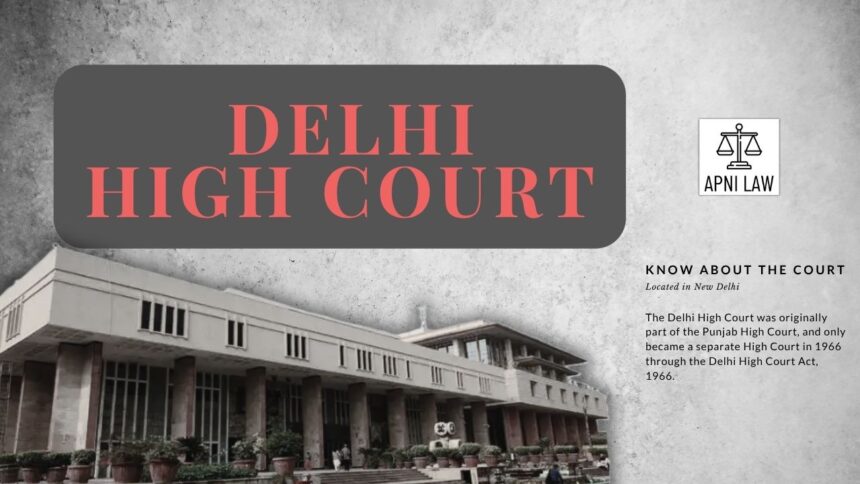Introduction
The Delhi High Court in Chand Mehra & Anr. vs. British Airways PLC delivered a significant ruling on the scope of commercial disputes under the Commercial Courts Act, 2015. The Court held that a disagreement between a passenger and an airline over a refund of a flight ticket does not fall under the definition of a commercial dispute. The case raised an important question: can every contract for service automatically be treated as a commercial dispute? The Court examined Section 2(1)(c) of the Act, which defines the term “commercial dispute.” The High Court explained that the definition is not meant to include every service contract. Instead, only contracts involving trade, business, or commerce will qualify. The judgment is important because it clarifies how far the jurisdiction of commercial courts extends and prevents ordinary consumer grievances from being misclassified as commercial matters.
Facts of the Case
The dispute started when a passenger purchased a flight ticket with British Airways. The ticket was either cancelled or not used, and the passenger sought a refund. Since the refund was not given, the passenger filed a commercial suit, claiming the dispute came within the scope of the Commercial Courts Act. The argument was that the ticket contract amounted to an agreement for the provision of services and should therefore be treated as a commercial dispute.
The District Court examined the claim and rejected this argument. It held that the matter was not a commercial dispute within the meaning of Section 2(1)(c) of the Act. Dissatisfied with this finding, the passenger filed an appeal before the Delhi High Court. The appeal questioned whether the lower court had applied the law correctly and whether a simple contract for air travel could fall within the scope of the Act.
What the Court Says
The Delhi High Court carefully analyzed the statutory framework. It said that the Commercial Courts Act was created to deal with disputes arising from trade and business transactions. The Court explained that merely because a contract involves services does not make it a commercial dispute. For a matter to qualify, the transaction must involve elements of commerce or trade.
The Court highlighted that the nature of an airline ticket is straightforward. The passenger pays the airline to carry them from one destination to another. The airline, in return, undertakes to provide transportation. The contract is therefore only a service contract. It does not contain any element of trade, finance, or commercial activity.
The Court further explained that commercial disputes usually arise between merchants, traders, bankers, or persons engaged in business. Examples include disputes over the import and export of goods or services, financing arrangements, or agreements linked directly to trade and commerce. A simple refund request for a cancelled or unused ticket does not fit into this category.
The High Court confirmed the view of the District Court. It ruled that the passenger’s claim could not be treated as a commercial suit. It also emphasized that not all service contracts automatically fall under the Act. Only when the contract includes an element of trade, commerce, or business beyond the basic service can it be treated as a commercial dispute.
Implications
This ruling has wide implications for both passengers and the legal system. First, it makes clear that disputes over airline refunds are not commercial disputes. These matters will continue to fall under ordinary civil or consumer forums, depending on the facts of each case. This prevents the Commercial Courts from being flooded with routine refund or service-related complaints.
Second, the decision draws a clear line between consumer service disputes and genuine commercial disputes. Many people assume that because a contract is involved, the matter must fall under commercial jurisdiction. The High Court’s ruling rejects this broad interpretation. It ensures that only contracts with clear commercial elements are taken up by Commercial Courts.
Third, the judgment strengthens the role of consumer forums. Passengers who have grievances about refunds, cancellations, or poor service can continue to approach consumer courts. These forums were specifically designed to deal with such issues. The decision prevents duplication of jurisdiction and avoids unnecessary legal complexity.
Finally, the judgment will guide lower courts in similar cases. It provides a clear test: if the dispute is only about provision of service without any trade or business element, then it is not a commercial dispute. This clarity helps in reducing confusion and ensures faster resolution of cases.
Conclusion
The Delhi High Court in Chand Mehra & Anr. vs. British Airways PLC delivered a clear and reasoned judgment. It ruled that a dispute between a passenger and an airline over a refund of a flight ticket is not a commercial dispute. The Court said that only contracts involving trade, commerce, or business fall under the scope of the Commercial Courts Act. Simple service contracts, like an airline ticket, remain outside this definition.
This judgment clarifies the law and protects the purpose of the Commercial Courts Act. It ensures that commercial courts remain focused on genuine business disputes, while consumer grievances stay with consumer and civil courts. The decision draws a clear boundary between ordinary service claims and commercial disputes, bringing much-needed clarity for both litigants and courts.








